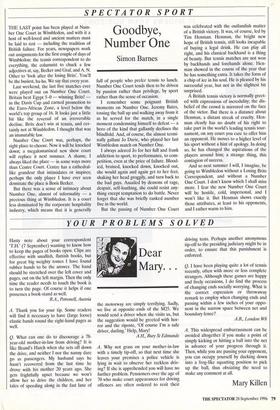SPECTATOR SPORT
Goodbye, Number One
Simon Barnes
THE LAST point has been played at Num- ber One Court in Wimbledon, and with it a host of well-loved and ancient matters must be laid to rest — including the tradition of British failure. For years, newspapers work out assignments for the first couple of days of Wimbledon: the tennis correspondent to do everything, the columnist to chuck a few adjectives at, say, Becker and Graf, and A. N. Other to 'look after the losing Brits'. You'll be the busiest, ha-ha. We say that every year. Last weekend, the last five matches ever were played out on Number One Court. Britain beat Egypt 5-0 — winning Brits! in the Davis Cup and earned promotion to the Euro-African Zone, a level below the world's top group of 16. It looks just a little bit like the reversal of an irreversible decline. Brits don't win at tennis, and cer- tainly not at Wimbledon. I thought that was an immutable law.
Number One Court was, perhaps, the right place to choose. Now it will be knocked down; a megalomaniacal new show court will replace it next summer. A shame, I always liked the place — in some ways more than Centre Court. Centre has a cathedral- like grandeur that intimidates or inspires; perhaps the only player I have ever seen dominate the place is Boris Becker.
But there was a sense of intimacy about Number One, almost of informality — a precious thing at Wimbledon. It is a court less dominated by the corporate hospitality industry, which means that it is generally full of people who prefer tennis to lunch. Number One Court tends then to be driven by passion rather than privilege, by sport rather than the sense of occasion.
I remember some poignant British moments on Number One. Jeremy Bates, tossing the ball up and walking away from it as he served for the match, in a single moment condemning himself to defeat — a hero of the kind that gallantly declines the blindfold. And, of course, the almost termi- nally gallant Jo Durie, who played her last Wimbledon match on Number One.
I always adored Jo for her full and frank addiction to sport, to performance, to com- petition, even at the price of failure. Blood- ied, bruised, knocked down, knocked out, she would again and again get to her feet, shaking her head groggily, and turn back to the bad guys. Assailed by demons of rage, despair, self-loathing, she could resist any- thing except temptation to do battle. Never forget that she was briefly ranked number five in the world.
But the passing of Number One Court was celebrated with the outlandish matter of a British victory. It was, of course, led by Tim Henman. Henman, the bright new hope of British tennis, still looks incapable of buying a legal drink. He can play all right, and his classical backhand is a thing of beauty. But tennis matches are not won by backhands and forehands alone. Hen- man showed in the course of the year that he has something extra. It takes the form of a chip of ice in his soul. Flu is pleased by his successful year, but not in the slightest bit surprised.
A British tennis victory is normally greet- ed with expressions of incredulity; the dis- belief of the crowd is mirrored on the face of the victor. But there is a distance about Henman, a distant streak of cruelty. Hen- man clearly has no doubt of his right to take part in the world's leading tennis tour- nament, on any court you care to offer him an opponent. He moves to a higher level of his sport without a hint of apology. In doing so, he has changed the aspirations of the players around him; a strange thing, this contagion of success.
And so next summer I will, I imagine, be going to Wimbledon without a Losing Brits Correspondent, and without a Number One Court. I don't know which I shall miss more. I fear the new Number One Court will be hostile, cold, impersonal, and I won't like it. But Henman shows exactly those attributes, at least to his opponents, and I rather warm to him.


















































































 Previous page
Previous page